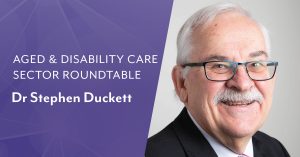Aged care sector roundtable with Dr Stephen Duckett
Recently, we were honoured to be joined by Stephen Duckett, Grattan Institute’s Health Program Director, for a dynamic virtual roundtable discussion about the current state of Australia’s aged care sector.
We were also joined by an expert panel as part of Royal College’s industry engagement to ensure the relevance of our training, assessment practices and resources.
This roundtable explored some of the most pressing issues facing aged care workers and the system as calls for reform mount from the recent Royal Commission into Aged Care Quality and Safety.
Stephen brought his wealth of experience and passion for the aged care sector, speaking to his reports Rethinking aged care and Reforming aged care.

Establishing a rights-based system
Australia’s age care system is failing. According to Stephen’s first report on aged care, the time has come to replace ‘band-aid’ solutions with a complete overhaul of a broken system.
He recommends a new rights-based system to put the needs of older Australians first.
The five key rights-based principles from his report include:
- Independence, self-fulfilment, and participation in community
- Informed and supported choice and control
- Universal access to reasonable and necessary supports
- Equity and non-discrimination
- Dignity, including dignity in death
Stephen’s second report, Reforming aged care, followed with details on how Australia can start to build a rights-based aged care system.
Through his analysis of the aged care system, a glaring comparison was drawn between Australia’s disability legislation and aged care legislation. The current disability legislation is all about rights, with the objective of promoting the independence of people with disabilities. Once a person is assessed as part of that system, they have rights, including rights to necessary and sufficient care.
Unfortunately, that is not how the age care system works. The Aged Care Act does not share that same rights-based ideology, rather a planning base that limits the number of available places.
As Stephen pointed out, if someone under the age of 65 years old has a disability they have a lot of rights. However, if a person with the exact same disability turns 65, they fall under a different ideology – which for Stephen and his team “made no sense to us”.
“You’ve got to reconceptualise the system onto a rights base”, Stephen explained.
“Drawing on the NDIS principles and the UN principles for older people, we have to start assessing the choices on policy against these principles, because otherwise you end up with a terrible mess of a policy as we have now because there is no coherent underlying philosophy.”
Like the current disability legislation, it is very possible that aged care could offer elements of independence with a rights-based system allowing people to express their views.
Elements for success
Speaking to his report Reforming aged care, Stephen shared some of the key elements that he recommends would improve Australia’s aged care system which were subsequently echoed by the Royal Commission’s report
These include:
- Tailored services based on personal needs. Once an individual has been assessed, they can be provided with the right support plan, determine funding and pay providers according to a fee schedule.
- Funding model reform to allow for more diverse care options and more availability of home care. This would also include a means-test for everyday living costs people would normally expend.
- Accountability through the implementation of regional system managers who can recommend the best support available based on local knowledge and availability.
- Transparency regarding service and facility standards to help people make informed decisions on care. Residential care facilities need to know where they stand, and address problems found through public reporting. There also needs to be an assessment of improvements.
Preparing the workforce to upskill
The roundtable focused heavily on two very important recommendation from Stephen’s reports; more staff and more qualified staff. There is a lot of work to be done from an education perspective to prepare and grow the aged care workforce. He also recommended that all workers should hold a Certificate III as part of their preparation. That requirement would see many staff currently working without that qualification. Again, this was also recommended by the Commission.
In terms of managing the transition and facilitating staff upgrading their skills, Stephen believes there is equal accountability.
“I don’t think the entire burden of reskilling the existing workforce should fall on the workers themselves, there is a responsibility amongst employers.”
Any transition is going to be a complex mix of individual, employer, and government responsibility to work out:
What can be done online?
What can be done by supervised assessment?
What can be done in a contract arrangement between a vocational education provider and an employer?
The industrial reality is that if the average person in a workforce has higher qualifications, then the average pay is going to go up. There are pay benefits for individuals in addition to getting the qualification. The qualifications will also improve their performance and create a more rewarding experience for all.
Discussions also touched on how the sector can sustain a flow of people who are committed and who want to go into aged care work.
“How do we prepare people leaving school or coming back into the workforce who might want to work in health and social care?” Stephan asked.
“It’s not just a matter of the certificate, it’s the commitment to wanting to work in this sector. That also means you’re going to have to pay them a bit more than we’re paying people now which is also very costly.”
Stephen estimates the report will increase government spending by $7 billion dollars – a 35 percent increase of current spending – predominantly to provide better pay and training for staff, therefore improving and expanding home and residential care.
Changing perceptions
Society is currently viewing aged care work as a low prestige job. However, people are also recognising that the terrible stories seen throughout COVID-19 and from the Royal Commission are not what they want for their aging parents and grandparents.
Stephen believes perceptions have improved in the last 20 years but our value on aged care will need to be reflected by how much we spend on it. It also means valuing aged care work as a skilled profession requiring dedicating people. These people should not only love the job but should be appropriately rewarded for it.
Stephen shared that he is on the board for Brotherhood of St Laurence who recently built a residential care facility opposite a primary school.
“We’ve got a café in the residential care facility which is open to members of the public in the hope that the facility will be much more integrated into the community,” Stephen explained.
Intergenerational care developments like this could help provide society with more natural insight into aged care, shattering the ‘out of sight, out of mind’ mentality.
Aging Australians still a part of the community and deserves the same enthusiasm of care as early childhood or school aged care.
Aged care around the globe
When asked about who he thinks is doing aged care right, Stephen pointed to Europe, particularly aged care facilities in the Netherlands. There are many different approaches, including dementia villages, that are promoting positive growth in the sector.
But he did note that Australia is also doing some things right in the residential aged care system, especially as an early adopter of a national scheme of health care assessment.
“We need to build on the enthusiasm and the experimentation that is happening and make sure the overarching principles are updated.”
About Dr Stephen Duckett
Dr Stephen Duckett has held top operational and policy leadership positions in health care in Australia and Canada, including as Secretary of what is now the Commonwealth Department of Health. He has a reputation for creativity, evidence-based innovation and reform in areas ranging from the introduction of activity-based funding for hospitals to new systems of accountability for the safety of hospital care. An economist, he is a Fellow of the Academy of the Social Sciences in Australia and of the Australian Academy of Health and Medical Sciences.



